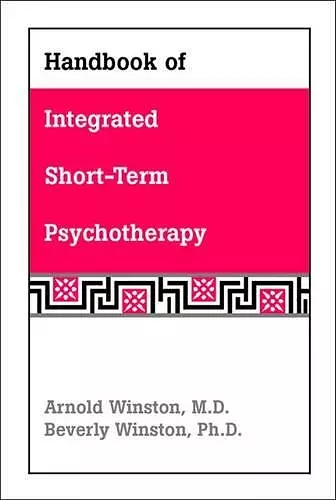Handbook of Integrated Short-Term Psychotherapy
Beverly Winston author Arnold Winston author
Format:Paperback
Publisher:American Psychiatric Association Publishing
Published:2nd Mar '02
Currently unavailable, and unfortunately no date known when it will be back

The sharp delineation of psychotherapies according to theoretical orientation has become a thing of the past, as can be clearly seen in this book by Winston and Winston, which integrates psychodynamic, cognitive-behavioral, and interpersonal therapies. The authors' clinically practical guidelines are brought to life with transcripts illustrating how such integration can be put into practice. Of particular importance is the consideration given to handling strains in the therapeutic alliance, crucial to any effective therapy. Marvin R. Goldfried, Ph.D., Professor of Psychology, Department of Psychology, State University of New York Although many books may promise an integrated approach, this book truly delivers on its title. Drs. Arnold and Beverly Winston present, in lucid fashion, an approach to short-term psychotherapy that includes and integrates psychodynamics and cognitive behavioral orientations. Extensive and detailed examples of patient-therapist interactions are provided, which help make didactic points come alive. There are also chapters on transitioning from one approach to another; medication and psychotherapy; and research on brief psychotherapy. I do not know of any other book on either long-term or short-term psychotherapy that integrates all this material in as practical and useful a way. This eminently sensible book will be warmly welcomed by anyone doing psychotherapy, short-term or long-term. Morris N. Eagle, Ph.D., Professor of Psychology, Derner Institute of Advanced Psychological Studies, Adelphi University
This remarkable guide for conducting short-term psychotherapy details the tools and techniques of brief psychotherapy, addressing four main areas: understanding, conceptualizing, and formulating the patient's problems; setting realistic treatment goals; knowing what to say to patients; and maintaining a positive therapeutic alliance.
In the past, short-term—or brief—treatment was practiced by few clinicians, its power relatively unknown. Today, the dual pressures of managed care and patient preference make it imperative to reconsider brief treatment, which has proven to be as effective as long-term therapy for many disorders and problems.
This remarkable guide for conducting short-term psychotherapy details the tools and techniques of brief psychotherapy, addressing four main areas:
• Understanding, conceptualizing, and formulating the patient's problems—Brief psychotherapy requires a concise formulation of the patient's problems within the first hours of treatment to ensure that the therapist understands and can focus on the patient's core problems early in therapy. The authors describe a detailed method of patient assessment and case formulation as the first building block in learning the fundamentals of short-term treatment.
• Setting realistic treatment goals—Brief psychotherapy sets explicit goals from the beginning, based on a thorough evaluation that incorporates the patient's wishes, desires, and dissatisfactions and an agreement about what the work of therapy will encompass.
• Knowing what to say to patients (i.e., technique)—Brief psychotherapy requires focused, concrete techniques within clear guidelines for each stage of treatment. With numerous clinical examples, the authors define a unified treatment that emphasizes the differential use of therapeutic interventions, such as cognitive-behavioral and interpersonal techniques, encompassing the continuum of interpretative to supportive approaches. They also offer an in-depth look into the therapeutic process: they use patient-therapist dialogues—including both patient and therapist comments and accompanying third-voice explanations—to chronicle the progress of four patients through the initial, middle, and termination phases of psychotherapy.
• Maintaining a positive therapeutic alliance—Although the quality of the therapeutic alliance is the best predictor of outcome in both traditional and brief psychotherapy, it is absolutely vital to the success of brief psychotherapy. The authors present a framework for maintaining and enhancing this alliance, including how to heal misunderstandings.
Concluding with a collaborative model and summary of the past 20 years' research on integrated treatment, this volume is more than a valuable clinical...
Those familiar with various approaches to psychotherapy will enjoy the way different methods are woven together based on the specific client's need at the moment. The busy clinician will appreciate the clarity with which material is concisely presented. The examples of cases offer support to the therapist who wants to move from theory to practice. In a time of decreasing sessions allowed for mental healthcare, this book is very valuable for ensuring that the most will be made of the sessions the client has with the therapist. [Five Stars]
* Doody's Health Science Book Review Journal *I strongly recommend this book. It will be both interesting and useful for experienced therapists, and especially so for trainees and students. Already, I have used it in psychotherapy supervision with a resident who stated voluntarily that it was 'very helpful.' In particular, she considered that the selection of the psychotherapeutic approach on the basis of the patient's location on the psychopathology health-sickness continuum and also the explication of the therapists' approaches, ranging from the brief supportive to the expressive, provided a logical formula for trainees. Also, this book can serve as a valuable review as well as a guide for experienced therapists.
The Winstons' emphasis on the importance of the various common brief psychotherapies along with their acknowledgement of the often needed use of combined brief psychotherapy and pharmacology is refreshing. Obviously, I am enthusiastic about the 'Handbook of Short-Term Psychotherapy.' The only problem is that it has not 'been around' for years.
-- John J. Schwab M.D. * Journal of Clinical PsychiatISBN: 9780880488143
Dimensions: 229mm x 152mm x 19mm
Weight: 413g
312 pages